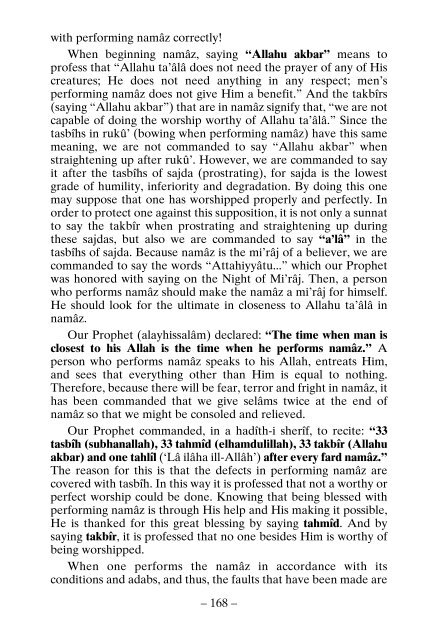Book of Namaz
You also want an ePaper? Increase the reach of your titles
YUMPU automatically turns print PDFs into web optimized ePapers that Google loves.
with performing namâz correctly!<br />
When beginning namâz, saying “Allahu akbar” means to<br />
pr<strong>of</strong>ess that “Allahu ta’âlâ does not need the prayer <strong>of</strong> any <strong>of</strong> His<br />
creatures; He does not need anything in any respect; men’s<br />
performing namâz does not give Him a benefit.” And the takbîrs<br />
(saying “Allahu akbar”) that are in namâz signify that, “we are not<br />
capable <strong>of</strong> doing the worship worthy <strong>of</strong> Allahu ta’âlâ.” Since the<br />
tasbîhs in rukû’ (bowing when performing namâz) have this same<br />
meaning, we are not commanded to say “Allahu akbar” when<br />
straightening up after rukû’. However, we are commanded to say<br />
it after the tasbîhs <strong>of</strong> sajda (prostrating), for sajda is the lowest<br />
grade <strong>of</strong> humility, inferiority and degradation. By doing this one<br />
may suppose that one has worshipped properly and perfectly. In<br />
order to protect one against this supposition, it is not only a sunnat<br />
to say the takbîr when prostrating and straightening up during<br />
these sajdas, but also we are commanded to say “a’lâ” in the<br />
tasbîhs <strong>of</strong> sajda. Because namâz is the mi’râj <strong>of</strong> a believer, we are<br />
commanded to say the words “Attahiyyâtu...” which our Prophet<br />
was honored with saying on the Night <strong>of</strong> Mi’râj. Then, a person<br />
who performs namâz should make the namâz a mi’râj for himself.<br />
He should look for the ultimate in closeness to Allahu ta’âlâ in<br />
namâz.<br />
Our Prophet (alayhissalâm) declared: “The time when man is<br />
closest to his Allah is the time when he performs namâz.” A<br />
person who performs namâz speaks to his Allah, entreats Him,<br />
and sees that everything other than Him is equal to nothing.<br />
Therefore, because there will be fear, terror and fright in namâz, it<br />
has been commanded that we give selâms twice at the end <strong>of</strong><br />
namâz so that we might be consoled and relieved.<br />
Our Prophet commanded, in a hadîth-i sherîf, to recite: “33<br />
tasbîh (subhanallah), 33 tahmîd (elhamdulillah), 33 takbîr (Allahu<br />
akbar) and one tahlîl (‘Lâ ilâha ill-Allâh’) after every fard namâz.”<br />
The reason for this is that the defects in performing namâz are<br />
covered with tasbîh. In this way it is pr<strong>of</strong>essed that not a worthy or<br />
perfect worship could be done. Knowing that being blessed with<br />
performing namâz is through His help and His making it possible,<br />
He is thanked for this great blessing by saying tahmîd. And by<br />
saying takbîr, it is pr<strong>of</strong>essed that no one besides Him is worthy <strong>of</strong><br />
being worshipped.<br />
When one performs the namâz in accordance with its<br />
conditions and adabs, and thus, the faults that have been made are<br />
– 168 –

















